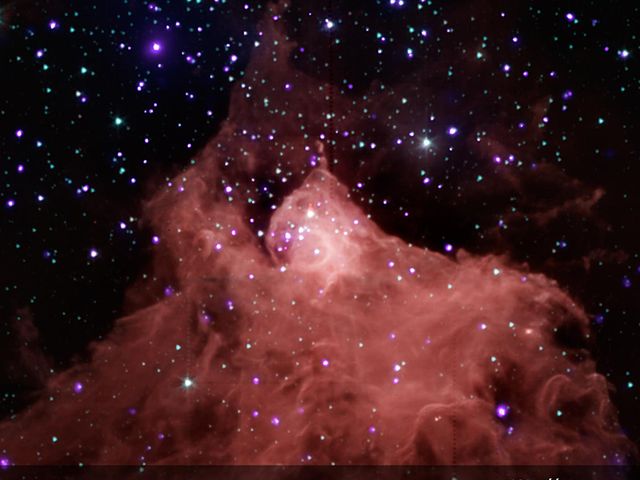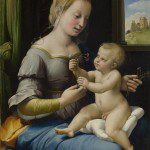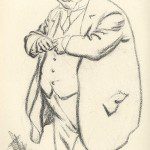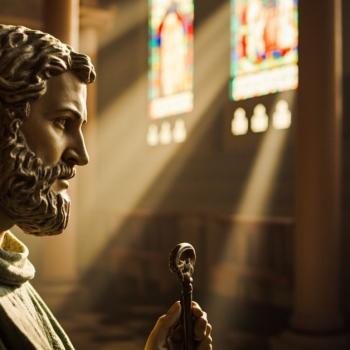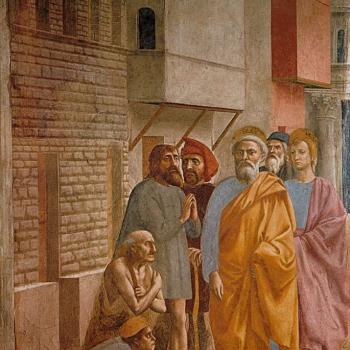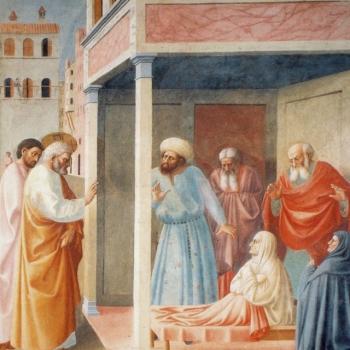(12-29-06)
[all passages RSV]
* * * * *
1. “Cloud of Witnesses” – Hebrews 12:1
. . . we are surrounded by so great a cloud of witnesses . . .
Word Studies in the New Testament (Marvin R. Vincent, Grand Rapids, MI: Eerdmans, 1980; originally 1887; Vol. 4, p. 536), a famous, standard Protestant reference work, comments on this verse as follows:
‘Witnesses’ does not mean spectators [Greek martus, from which is derived martyr], but those who have borne witness to the truth, as those enumerated in chapter 11. Yet the idea of spectators is implied, and is really the principal idea. The writer’s picture is that of an arena in which the Christians whom he addresses are contending in a race, while the vast host of the heroes of faith who, after having borne witness to the truth, have entered into their heavenly rest, watches the contest from the encircling tiers of the arena, compassing and overhanging it like a cloud, filled with lively interest and sympathy, and lending heavenly aid.
Saints in heaven are therefore aware of, and observe events on earth, “with lively interest,” as Vincent puts it.
Revelation 6:9-10 . . . I saw under the altar the souls of those who had been slain for the word of God and for the witness they had borne; they cried out with a loud voice, “O Sovereign Lord, holy and true, how long before thou wilt judge and avenge our blood on those who dwell upon the earth?”
Here the martyrs in heaven are saying what are known as “imprecatory prayers”: pleas for God to rescue and vindicate the righteous. Examples can be found particularly in the Psalms (Psalms 35, 59, 69, 79, 109, 139) and in Jeremiah (11:18 ff., 15:15 ff., 18:19 ff., 20:11 ff.). An angel offers up a very similar prayer in Zechariah 1:12. Jesus mentions a type of this prayer in Matthew 26:53, in which He stated that He could “pray” to the Father and receive legions of angels to prevent His arrest had it been the Father’s will.
Therefore dead saints are praying for Christians on earth. If they can intercede for us, then why shouldn’t we ask for their prayers? Clearly, they’re aware of what is happening on earth. They are more alive, unfathomably more righteous, and obviously closer to God than we are. Omniscience isn’t required for them to hear our prayers, as is often charged. Rather, we have reason to believe that they are out of time, by God’s power, because to be in eternity is to be outside of the realm of time. That allows them to answer many requests for prayer because they have an infinite amount of “time” to do it.
Even Martin Luther and John Calvin admitted that the saints may be praying for us in heaven:
Although angels in heaven pray for us . . . and although saints on earth, and perhaps also in heaven, do likewise, it does not follow that we should invoke angels and saints.
(Smalcald Articles, 1537, Part II, Article II in Theodore G. Tappert, translator, The Book of Concord, St. Louis: Concordia Pub. House, 1959, 297)
I grant they pray for us in this way.
(Institutes of the Christian Religion, III, 20, 24)
If so, then how can it be wrong to simply ask dead saints to pray for us, since they are aware of earthly happenings?
Revelation 5:8 . . . the four living creatures and the twenty-four elders fell down before the Lamb, each holding a harp, and with golden bowls full of incense, which are the prayers of the saints.
Revelation 8:3-4 And another angel came and stood at the altar with a golden censer; and he was given much incense to mingle with the prayers of all saints upon the golden altar before the throne; and the smoke of the incense rose with the prayers of the saints from the hand of the angel before God. (cf. Tobit 12:12,15)
It’s somewhat unclear whether the twenty-four elders in this scene are angels or men, and commentators differ. References to them clad in white garments, with golden crowns (4:4,10) suggests the view that these elders are glorified human beings (see, for example, 2:10, 3:5,11, 6:11, 7:9,13-14, 2 Timothy 4:8, James 1:12, 1 Peter 5:4). In any event, in both examples above, creatures – whether men or angels – are involved with our prayers as intercessory intermediaries, which isn’t supposed to happen according to most versions of Protestant theology, where all prayer goes straight to God with no creature involved other than the one who prays the prayer. What in the world are these creatures doing with “the prayers of the saints”?
Also the deuterocanonical book 2 Maccabees (15:13-14), describes Jeremiah the prophet loving his people after his death and praying for them. since Protestants don’t accept that book as inspired, we might offer them also Jeremiah 15:1: “Then the Lord said to me, ‘Though Moses and Samuel stood before me, yet my heart would not turn toward this people.'”
Here it appears that God receives the prayers of the dead saints as a matter of course. Moses and Samuel were both known as intercessors. One could argue that this is only a hypothetical, yet even parables can’t contain something that isn’t true. This mentions a state of affairs which is assumed to be possible (or else why would Jeremiah mention it at all, as coming from God?)
A) 1 Samuel 28:12,14-15 (Samuel): the prophet Samuel appeared to King Saul to prophesy his death. The current consensus among biblical commentators (e.g., The New Bible Commentary, The Wycliffe Bible Commentary) is that it was indeed Samuel the prophet, not an impersonating demon (since it happened during a sort of seance with the so-called “witch or medium of Endor”). This was the view of, e.g., St. Justin Martyr, Origen, and St. Augustine, among others. Ecclesiasticus (Sirach) 6:19-20 reinforces the latter interpretation: “Samuel . . . after he had fallen asleep he prophesied and revealed to the king his death, and lifted up his voice out of the earth in prophecy, to blot out the wickedness of the people.”
B) Matthew 17:1-3 (the Transfiguration: Moses and Elijah): . . . Jesus took with him Peter and James and John his brother, and led them up a high mountain apart. And he was transfigured before them, and his face shone like the sun, and his garments became white as light. And behold, there appeared to them Moses and Elijah, talking with him. (see also Mark 9:4 and Luke 9:30-31)
C) Matthew 27:52-53(raised bodies after the crucifixion): . . . the tombs also were opened, and many bodies of the saints who had fallen asleep were raised, and coming out of the tombs after his resurrection they went into the holy city and appeared to many.
D) Revelation 11:3,6 (the “Two Witnesses”): And I will grant my two witnesses power to prophesy for one thousand two hundred and sixty days . . . they have power to shut the sky, that no rain may fall . . . and they have power over the waters to turn them into blood, and to smite the earth with every plague . . .
These two witnesses are killed (11:7-9), then raised after “three and a half days” and “stood up on their feet” (11:11), and then “went up to heaven in a cloud” (11:12). Many Church Fathers thought these two were Enoch and Elijah, because both of them didn’t die; thus this would explain their dying after this appearance on earth. Some Protestant commentators think the two witnesses are Moses and Elijah, because of the parallel to the Transfiguration, and also similarities with the plagues of Egypt and the fact that Elijah also stopped the rain for three-and-a-half years (James 5:17).
We must conclude based on the above passages that contact between heaven and earth is God’s will; otherwise He wouldn’t have permitted it in these instances. The Catholic belief in more interconnection between heaven and earth cannot be ruled out as “unbiblical”. One has to try other arguments to refute our beliefs in this regard.
Prayers for the dead are very clearly presented in the deuterocanonical book of 2 Maccabees (12:39-45). Protestants don’t accept that book as part of the Bible, of course, so is there anything about prayers for the dead in the New Testament? It may shock and surprise Protestants to hear it, but yes, there is. I contend that there are three passages:
A) 1 Corinthians 15:29 Otherwise, what do people mean by being baptized on behalf of the dead? If the dead are not raised at all, why are people baptized on their behalf?
Protestants consider this one of the most mysterious and odd passages in the entire Bible. But it really isn’t that difficult to interpret. It’s very similar to 2 Maccabees 12:44: “It is superfluous and vain to pray for the dead if the dead rise not again. . . .” That gives us our clue as to what Paul means here. In the Bible “baptism” can describe not just the water ritual but also afflictions and penances (Luke 12:50, Mark 10:38-39, Matthew 3:11, 20:22-23, Luke 3:16). So Paul is saying that we pray and fast and undergo penance for the dead in purgatory precisely because they are resurrected and will live eternally. The “penance” interpretation is supported contextually by the next three verses, where the Apostle speaks of being in peril every hour, and dying every day. So this is a proof of both purgatory and prayers for the dead.
B) 2 Timothy 1:16-18 May the Lord grant mercy to the household of Onesiphorus, for he often refreshed me; he was not ashamed of my chains, but when he arrived in Rome he searched for me eagerly and found me – may the Lord grant him to find mercy from the Lord on that Day – and you well know all the service he rendered at Ephesus.
This is another passage that gives Protestants fits. The problem is that it seems to plainly imply that Paul is praying for a dead man. Yet Protestants can’t accept that practice because of their theology; therefore, they must explain this away somehow. What they do is either deny that Onesiphorus is dead, or that Paul is praying. Most of the nine Protestant commentaries I consulted for this passage seen admit that he was praying, but deny that the person was dead. Some try to say that Paul was merely “wishing”, but I don’t see any difference between that and a prayer: it looks like a word game to avoid the implications. The same commentaries said he was possibly dead (two), take no position (two), think he was “probably not” dead (one), or deny it (three). A.T. Robertson, the great Baptist Greek scholar, felt that he was “apparently” dead and that Paul was “wishing” rather than praying. I think it’s much more plausible to simply take the Catholic position: the man died and Paul was praying for him.
C) Acts 9:36-37,40-41: Now there was at Joppa a disciple named Tabitha, which means Dorcas . . . In those days she fell sick and died . . . But Peter . . . knelt down and prayed; then turning to the body he said, “Tabitha, rise.” And she opened her eyes, and when she saw Peter she sat up. And he gave her his hand and lifted her up. Then calling the saints and widows he presented her alive.
Now, what would Peter have been praying for?: obviously, that Tabitha would be raised from the dead. So it seems indisputable that St. Peter literally prayed for a dead person, the very thing that Protestants say is not permitted, and supposedly not recorded in the Bible. And Jesus prayed for Lazarus, just before he was raised from the dead, in John 11:41-42 (“Father, I thank thee that thou hast heard me. I knew that thou hearest me always, but I have said this on account of the people standing by, that they may believe that thou didst send me”). The Bible informs us that the disciples raised people from the dead (Mt 11:5, Lk 7:22) and that Jesus told them that they would be able to, and should, do so (Mt 10:8). So they went out and did it. It’s natural to assume that prayer would accompany these extraordinary miracles (because God performs miracles – thus we ask). So almost certainly they prayed for the dead, too. It’s as simple as that. The prophet Elijah did the same thing in the Old Testament:
D) 1 Kings 17:21-22: Then he stretched himself upon the child three times, and cried to the Lord, “O Lord my God, let this child’s soul come into him again.” And the Lord hearkened to the voice of Elijah; and the soul of the child came into him again, and he revived.
Martin Luther and his successor as head of Lutheranism, Philip Melanchthon, accepted prayers for the dead:
As for the dead, since Scripture gives us no information on the subject, I regard it as no sin to pray with free devotion in this or some similar fashion: “Dear God, if this soul is in a condition accessible to mercy, be thou gracious to it.”
(Confession Concerning Christ’s Supper, 1528, in Luther’s Works, edited by Jaroslav Pelikan, vol. 37, 369)
[W]e know that the ancients speak of prayer for the dead, which we do not prohibit . . .
(Apology to the Augsburg Confession: Article XXIV, 94)


